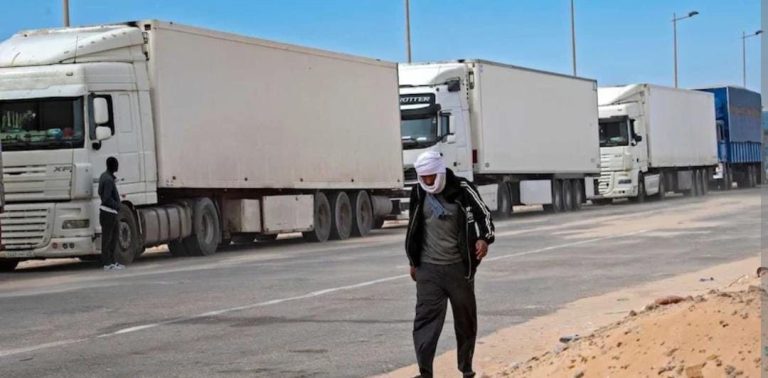Search for Missing Truckers: Morocco, Burkina Faso, and Niger Cooperate
The fate of four Moroccan truck drivers who went missing between Burkina Faso and Niger last Saturday remains unclear. According to sources familiar with the matter, a crisis unit within the Ministry of Foreign Affairs, African Cooperation, and Moroccans Living Abroad is currently working alongside Morocco’s embassies in Burkina Faso and Niger, in close coordination with the authorities of both countries, to locate the missing individuals.
The sources revealed that the drivers went missing on the road between Dori in Burkina Faso and Tera in Niger. This route passes through the Sitenga region, which recently witnessed a deadly ambush (between Dori and Sitenga) that claimed the lives of 18 soldiers and several civilians.
The same sources stated, “This incident is very recent, and anyone in the area is presumed to be aware of it. Precautionary measures, such as obtaining security escorts, should have been taken to avoid risks of ambush, kidnapping, or attacks.”
Meanwhile, professional sources in the international goods transportation sector reported new information from Burkinabé drivers to their Moroccan counterparts, suggesting that “the three missing trucks are currently in the Nigerian capital, Niamey.”
However, these sources expressed skepticism, stating, “There needs to be Moroccan personnel on-site to fully verify the accuracy of this information.”
As of now, no jihadist group in the Sahel has claimed responsibility for the disappearance of the four Moroccan drivers.
Given the escalating terrorist threat posed by the Islamic State in the Greater Sahara (ISGS), which operates between Mali, Burkina Faso, and Niger, the same sources highlighted that “truck convoys are regularly organized under the protection of the Burkinabé army to ensure safe transport across borders, particularly between Dori and Tera.”
The northeastern border region of Burkina Faso is currently facing a significant jihadist threat, exacerbating instability and insecurity characterized by recurring violence. The affected countries are intensifying efforts to secure these areas and mitigate the terrorist threat, while also providing substantial humanitarian aid to victims and displaced individuals.
the Moroccan driver’s decision to proceed through the area, despite the recent deadly ambush on January 11, underscores the dangerous nature of this region, as reported by sources.
The sources also reminded workers in the transportation sector to “strictly adhere to established security protocols. Unauthorized travel through sensitive areas is unacceptable due to potential risks.” They emphasized that “complying with security measures is essential to ensure the safety of convoys.”
N.A
-

South Africa Confronts Funding Gap as US Withdraws Support for World’s Largest HIV Program
Edited By: Safae FathiSouth Africa faces a significant challenge as the United States withdraws approximately $427 million in support for... Health -

Gabon’s President Oligui Nguema Slams Rejection of Legislative Candidates
Edited By: Africa Eye Gabonese President Brice Clotaire Oligui Nguema has strongly criticized the exclusion of several candidates from the upcoming... Politics -

Libya: Delayed Municipal Elections Finally Held in Seven Northwestern Towns
Edited By : Tendai Zola Libyans in seven municipalities in the country’s northwest were finally able to cast their votes on... Politics -

Africa: Fight for Justice Over Bolloré’s Ports Empire
Edited By: Fatimatou babdinA coalition of African civil society groups has launched a landmark legal battle in Paris, seeking accountability... Economy -

The Fight to Bring Africa’s Art Home
Edited By : Widad WAHBIFor over a century, thousands of African artifacts, including masks, statues, and royal thrones, were taken... Video -

Bijagós Islands: A Hidden Cultural and Ecological Gem Emerges from Obscurity
Edited By: Fatomatou konèOff the coast of Guinea-Bissau lies the Bijagós Archipelago, a scattering of more than eighty islands where... Chosen for you

 Follow the latest news on WhatsApp
Follow the latest news on WhatsApp  Follow the latest news on Telegram
Follow the latest news on Telegram  Follow the latest news on Google News
Follow the latest news on Google News  Follow the latest news on Nabd
Follow the latest news on Nabd 


















